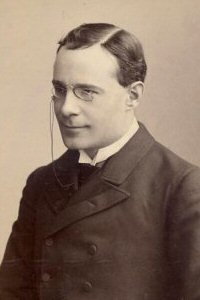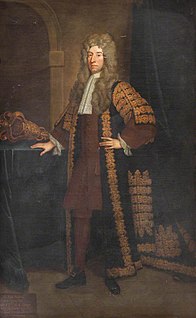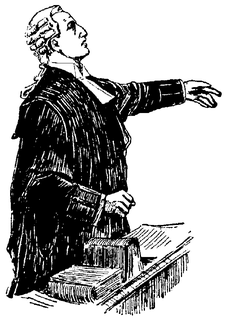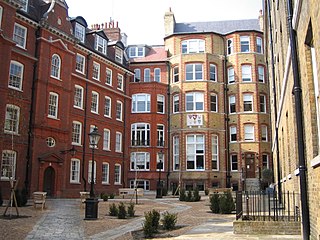
Iolanthe; or, The Peer and the Peri is a comic opera with music by Arthur Sullivan and libretto by W. S. Gilbert. It is one of the Savoy operas and is the seventh of fourteen operatic collaborations by Gilbert and Sullivan. In the opera, the fairy Iolanthe has been banished from fairyland because she married a mortal; this is forbidden by fairy law. Her son, Strephon, is an Arcadian shepherd who wants to marry Phyllis, a Ward of Chancery. All the members of the House of Peers also want to marry Phyllis. When Phyllis sees Strephon hugging a young woman, she assumes the worst and sets off a climactic confrontation between the peers and the fairies. The opera satirises many aspects of British government, law and society. The confrontation between the fairies and the peers is a version of one of Gilbert's favourite themes: a tranquil civilisation of women is disrupted by a male-dominated world through the discovery of mortal love.

Spencer Compton, 1st Earl of Wilmington, was a British Whig statesman who served continuously in government from 1715 until his death. He served as the Prime Minister from 1742 until his death in 1743. He is considered to have been Britain's second Prime Minister, after Sir Robert Walpole, but worked closely with the Secretary of State, Lord Carteret, in order to secure the support of the various factions making up the Government.

Richard Mansfield was an English actor-manager best known for his performances in Shakespeare plays, Gilbert and Sullivan operas, and the play Dr. Jekyll and Mr. Hyde.

Richard Onslow, 1st Baron Onslow PC was a British Whig Member of Parliament, known as Sir Richard Onslow, 2nd Baronet from 1688 until 1716. He served as the Speaker of the House of Commons from 1708 until 1710 and as Chancellor of the Exchequer from 1714 until 1715. Onslow was a very unpopular figure amongst members of both political parties, particularly during his time as Speaker. He was extremely pedantic and showed an absolute devotion to principle, as a result he was given the nickname "Stiff Dick".
Robert D'Oyly was a Norman nobleman who accompanied William the Conqueror on the Norman Conquest, his invasion of England. He died in 1091.

Rupert D'Oyly Carte was an English hotelier, theatre owner and impresario, best known as proprietor of the D'Oyly Carte Opera Company and Savoy Hotel from 1913 to 1948.

Helen Carte Boulter, also known as Helen Lenoir, was the second wife of impresario and hotelier Richard D'Oyly Carte. She is best known for her stewardship of the D'Oyly Carte Opera Company and Savoy Hotel from the end of the 19th century and into the early 20th century.
Minehead was a parliamentary borough in Somerset, forming part of the town of Minehead, which elected two Members of Parliament (MPs) to the House of Commons from 1563 until 1832, when the borough was abolished by the Great Reform Act.
Three baronetcies were created for persons with the surname D'Oyly, two in the Baronetage of England and one in the Baronetage of the United Kingdom. One creation is extant as of 2008.

The Story of Gilbert and Sullivan is a 1953 British technicolor film that dramatises the story of the collaboration between W. S. Gilbert and Arthur Sullivan. Gilbert and Sullivan wrote 14 comic operas, later referred to as the Savoy Operas, which became the most popular series of musical entertainments of the Victorian era and are still popular today.
Sir Charles Cox (1660–1729) was an English brewer and Whig Member of Parliament for Southwark from 1695 to 1712. For many years afterwards the MP for Southwark would generally be a brewer.

Sir Charles D'Oyly, seventh baronet, (1781–1845), was a British public official and painter from Dhaka. He was a member of the Bengal Civil Service based in Calcutta, Dhaka and Patna from 1797 to 1838. He was also a talented and prolific amateur artist who published many books featuring engravings and lithographs featuring Indian subject matter.

Christopher Webb Smith, was an English-born bird painter and public official. After joining the East India Company he was sent to India in 1811, where he remained in various administrative posts until 1842.
Sir William D'Oyly, 1st Baronet was an English politician who sat in the House of Commons variously between 1654 and 1677.

Charles Egerton was an English Member of Parliament.
Colonel Henry Cornewall was an English soldier, courtier and Member of Parliament.
Sir Henry Belasyse, also spelt Bellasis, was an English military officer and Member of Parliament. An effective soldier who held a number of senior commands, he was held responsible for the looting that followed the Battle of Cádiz in 1702 which severely damaged the Hapsburg cause in the War of the Spanish Succession. He was dismissed from the army in 1703 and while later reinstated, never held active command again
Charles Stanhope (1673–1760) was an English barrister and politician who sat in the House of Commons from 1717 to 1741. Deeply implicated in transactions related to the South Sea Bubble, possibly concerned with political corruption, he was strongly defended by those in government, and was acquitted of all charges brought against him.

The Palau del Parlament de Catalunya is the meeting place of the Parliament of Catalonia, located in Barcelona. It was built between 1717 and 1727 as the arsenal of the Ciutadella, to designs of Jorge Próspero de Verboom.
Thomas Tower of Weald House, Essex was a British lawyer and Member of Parliament.













